 Petzlover
PetzloverBoth Cypro Kukur and Gaddi Kutta are originated from India. Cypro Kukur may grow 19 cm / 8 inches higher than Gaddi Kutta. Cypro Kukur may weigh 46 kg / 102 pounds more than Gaddi Kutta. Cypro Kukur may live 3 years less than Gaddi Kutta. Cypro Kukur may have less litter size than Gaddi Kutta. Cypro Kukur requires Low Maintenance. But Gaddi Kutta requires High Maintenance
The Cypro Kukur is an ancient dog breed which originated in the Kumaon area of India. It is interesting to note that the name Cypro Kukur translates to Cyprus Dog, but the dog doesn’t appear to have originated in Cyprus.
The dog was used to guard livestock. It has a history that goes right back to about 300 years BC. The true history of this dog is shrouded in mystery and there are researchers who believe that foreign explorers to the Cyprus region imported these Kumaon watchdogs. There are those who believe the dog descended from the Molosser dog breeds.
The dog is also known as the Indian Mastiff or Kumaon Mastiff, but it is facing extinction with just a small number of pure Cypro Kukur remaining in the area. Today, however, there appears to be quite a large number of the dogs in Europe.
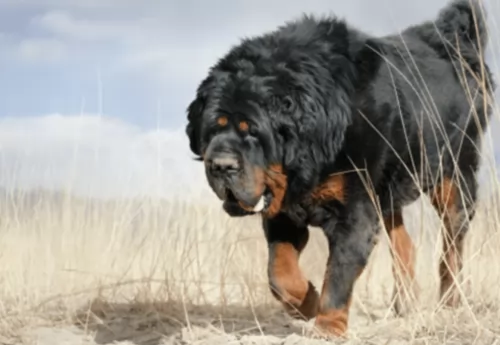 The Gaddi Kutta is mountain dog of the mastiff line from northern India. They are mostly found in the western Himalayas and Himachal Pradesh. It is also seen in Nepal and often named the Indian Panther Hound and the Mahidant Mastiff. They were bred to hunt but because of their strength and intelligence they are used to guard and herd goats and sheep. They are strong enough to defeat or scare off a panther or snow leopard and intelligent enough to work independently in finding strays and bringing them back to their pens. They have been known to protect herds of cattle from bears and leopards.3 or 4 of them working together can handle the guard duties for thousands of cattle.
The Gaddi Kutta is mountain dog of the mastiff line from northern India. They are mostly found in the western Himalayas and Himachal Pradesh. It is also seen in Nepal and often named the Indian Panther Hound and the Mahidant Mastiff. They were bred to hunt but because of their strength and intelligence they are used to guard and herd goats and sheep. They are strong enough to defeat or scare off a panther or snow leopard and intelligent enough to work independently in finding strays and bringing them back to their pens. They have been known to protect herds of cattle from bears and leopards.3 or 4 of them working together can handle the guard duties for thousands of cattle.
Their reputation precedes them – as ferocious and courageous, unmatched in their instincts to protect what is theirs. In the line of the Mastiffs and Molosser, the Gaddi is powerful and agile, and considered to be of ancient heritage though no one is sure what their origin is. The local myth is that dogs were crossed with tigers. It is more likely that dingo-like wild hounds from the Himalaya were crossed with the Tibetan Mastiff to create the Gaddi Kutti. Also found in Pakistan, most lines of the breed have been crossed with others including the German Shepard and the Bully Kutta. Outside of the Himalayas there are not many if any pure lines. The Gaddi Kutta is a good family dog if you socialize him as a puppy. He will be gentle, calm and intuitive with his family, but aggressive toward strangers and other dogs.
The Cypro kukur is a large dog standing at anything from 70 – 90 cm and also weighing in the region of 70 – 90kg. He has an attractively lean, muscled body. He has a large head with a strong neck and floppy ears. The tail is long. The short, thick coat is a light fawn color with brindle markings or he can be white with black marking.
The Cypro Kukur is an aggressive dog breed and that is why he was used to guard livestock to ward off wild animals. He makes an excellent guard dog. However with training and socialization he makes an excellent family pet, becoming friendly and obedient around other pets and people.
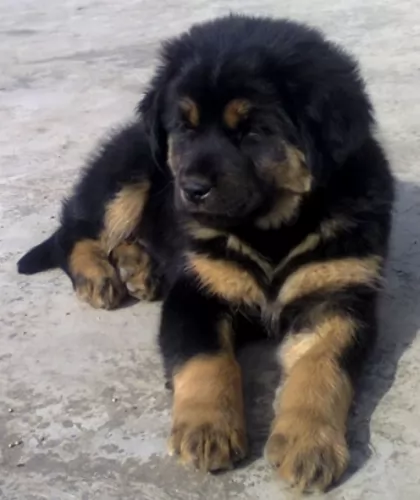 The Gaddi Kutta is a mastiff but he is athletic, has tremendous speed and stamina. He is muscular and deep-chested, leaner than most of the mastiff lines. Their ears can be either natural or cropped, on a very large head. One of the most important traits of the Gaddi Kutta is the massive, arched neck that protects them from predators. He is sturdy with a heavily feathered, thick tail curling over the back.
The Gaddi Kutta is a mastiff but he is athletic, has tremendous speed and stamina. He is muscular and deep-chested, leaner than most of the mastiff lines. Their ears can be either natural or cropped, on a very large head. One of the most important traits of the Gaddi Kutta is the massive, arched neck that protects them from predators. He is sturdy with a heavily feathered, thick tail curling over the back.
They are massive, wolf like dogs, fiery and huge but intelligent and faithful to their people. They are scary even when they are trying to be affectionate. The muzzle is strong, and the mane is thick. The Gaddi has long, heavy legs and very large feet that are feathered, making him even more intimidating.
There are two types of Gaddi Kutti – the longhaired and the shorthaired. The longhaired is the most common and has a fuller coat with long feathering on the tail, legs and chest and some feathering on the feet. They are all usually solid colors of yellow, fawn and cream or they could be piebald, brown or brindle. They have a woolly dense undercoat.
The large Cypro Kukur is a fairly aggressive dog who makes for an excellent guard- or watch dog. It is important to have this dog trained and socialized as he can be aggressive.
He may be large and intimidating to look at with some aggressive tendencies, but with training they can become domesticated and then he has the capability of becoming quiet, well behaved and obedient.
If you’re looking for a large, loyal friend, then choose the Cypro Kukur, as with socialization he can make a good and loyal family pet.
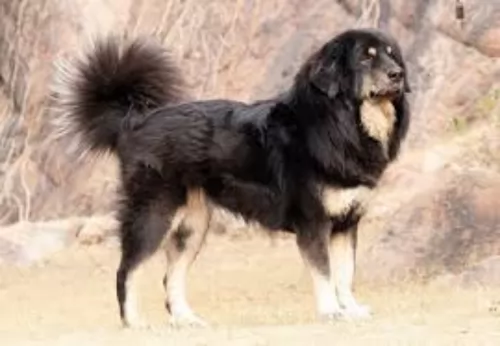 They are not always great with children, but they will protect own children in their family. Do not leave unattended.
They are not always great with children, but they will protect own children in their family. Do not leave unattended.
They have the ability to bring down a wolf or even a bear or snow leopard.
Because of his size, temperament and coat he is not very adaptable. He is good outside in a colder region and with a lot of land to roam, but not in a hot region or in an apartment.
This breed is very smart, learns quickly on his own.
The Cypro Kukur can live to be 10 – 12, but he is a large dog and there will be some health concerns that your dog may never develop but are worth knowing about. These are Hip Dysplasia and Gastric Torsion.
Hip dysplasia is one of the most commonly occurring conditions that dogs have to contend with so it is worth knowing about.
It is an hereditary disease that progressively gets worse with age. Your dog can be uncomfortable and in pain. Canine hip dysplasia is when the head of the femur bone doesn’t fit properly into the hip socket. Veterinarians tell us that most dogs are actually born with normal hip joints, but that gradual subluxation brings about the development of abnormally shaped hip joints.
Gastric dilatation volvulus is another name for gastric torsion, a medical condition also referred to as a twisted stomach.
Excess gas causes what is known as bloat and its a life-threatening condition that will require immediate attention from your vet.
You’ll notice your pet’s stomach is swollen, your dog will have difficulty with breathing and he may be vomiting. It is a disease brought on by a number of factors.
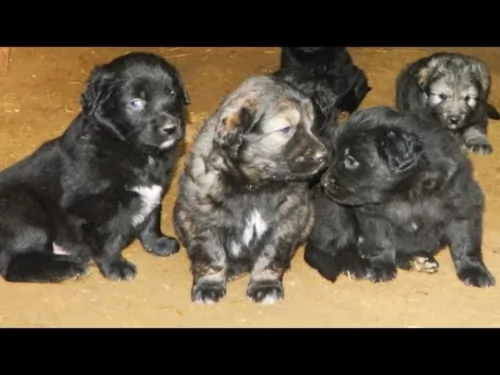 The breed is prone to obesity if they do not get enough exercise or a decent diet.
The breed is prone to obesity if they do not get enough exercise or a decent diet.
This is a large dog and he will require an adequate amount of exercise. He is the kind of dog that isn’t recommended for couch potatoes. He will need to join you in your walks every day, or you can allow him to join you with your jogging or cycling.
The short coat of this large dog is easy to care for. He is a moderate shedder so a good brush twice a week will be all he needs to remove loose hairs and keep his coat healthy and shiny. Brushing him gives you the chance to check him for fleas and ticks too.
Other grooming for the Cypro Kukur should include trimming his nails and brushing his teeth twice a week with canine-approved toothbrush and toothpaste. Make a point of checking inside his ears as dogs with floppy ears are prone towards ear infections.
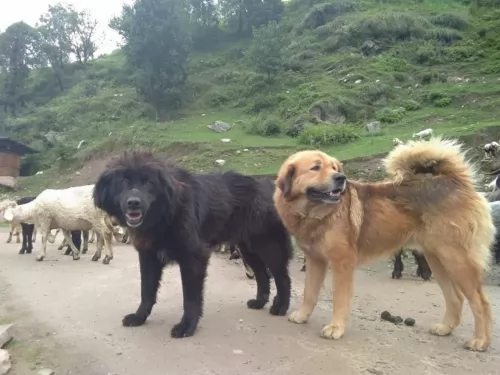 Should feed a high quality dry puppy food for large dogs. Give 1-2 cups per day split into 2-3 meals.
Should feed a high quality dry puppy food for large dogs. Give 1-2 cups per day split into 2-3 meals.
Again you want to feed high quality dry adult dog food for large dogs. Give 3-4 cups per day split into 2 meals. Watch for obesity and if your Gaddi Kutta is gaining too much weight, cut back.
The Gaddi Kutti seems to be immune to the most common of canine diseases.
This is a breed of very large dogs that need daily exercise by walking and running. However, since they have been fairly isolated in India and the Himalayas, he has not been exposed to organized dog play and exercise such as agility, dock jumping or field trials. He would probably succeed at all three.